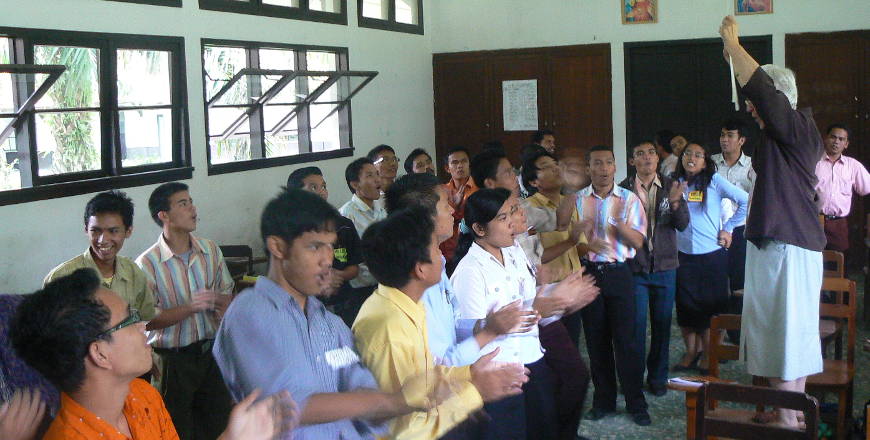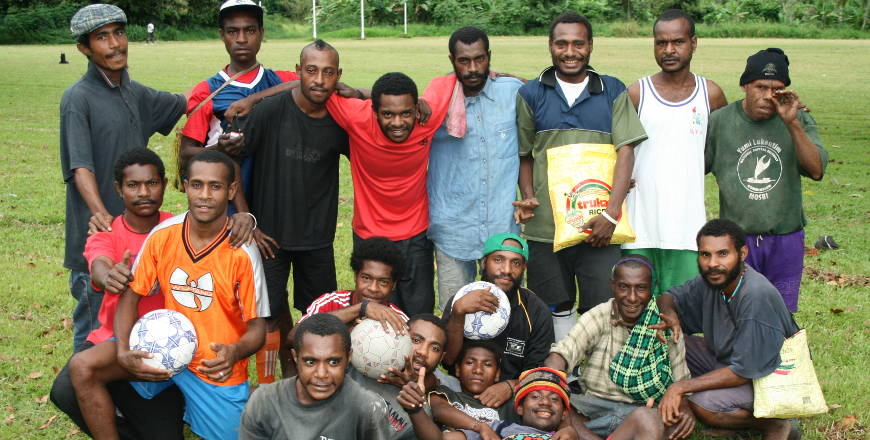But I’ve Retired from Teaching!
This was one of the thoughts that first came to mind when Julian Pfitzner was asked to teach a three week English course for students at a seminary in Indonesia. Julian takes up the story…
On 12 July, Glenice Hartwich asked me, if I and someone else, would be interested in taking a three week course at HKBP (Huria Kristen Batak Protestan) Seminary in Pematang Siantar, teaching English as a second language to first-year seminary and postgraduate Master of Divinity students. My response was: ‘1. Where is Pematang Siantar? 2. But I’ve retired from teaching! 3. How do you teach English?’ Having accepted the invitation to go to Pematang Siantar, my next thought was ‘Who could I teach with?’ On 16 July I asked Mark and Marion Schubert if they would like to join me. Their first response was ‘No, we are retired, we have no passports, and we have no experience in teaching English’. (Julian and Mark are ex-Concordia, and ex-physics teachers!) However, the Bible study group Mark led the next day was supportive of the idea and the Joshua text they were studying emphasised acting with courage and faith.
So together we decided to visit previous teachers and received help and encouragement. Gradually we were all persuaded that we could pick up enough skills and techniques to make a useful contribution. The day before we flew out, Marion’s passport arrived!
The first-year students were mainly high school graduates, 60 men and 17 women from all over Indonesia, who had recently studied English, but the 27 Master of Divinity mature-age students had had little recent exposure to English. All were meeting for the first time to be motivated and inspired by us in English. Our main qualification was that we could speak (reasonably) good English!
At 7.30am we joined the students in the chapel for morning devotion in English, including beautiful, strong singing, often in four-part harmony. In the classes, which began at about 8.15am, we would sometimes examine the meaning and pronunciation of words from hymns we had sung (eg Why shouldn’t ‘you’ and ‘thou’ rhyme, or Lord and worship?).
There were three classes, rotating through three one-hour lessons each weekday morning. Reina Sipahutar from Nommensen University, took English structure.
My lessons, in conversational English, were based on a theme for the day and used rhymes, tongue-twisters, limericks, action songs, games, dialogues, chants, vocabulary (words and pictures) and a Bible text. Mark’s lessons in English comprehension were based on a printed, simplified New Testament story (eg Jesus feeding the 5,000), which students read together, followed by a discussion of difficult words, and then written questions where students often helped each other with the answers. They then went through the answers together, often finishing with a song and a Bible verse. All lessons started and ended with prayer, usually taken by a student. Marion helped with typing and sometimes in lessons.
Lunch was with the students in the mensa/dining hall. In the afternoons we rested, sent emails to family and friends, prepared lessons, did some shopping or went sightseeing. Dinner was prepared for us at the guest house, and at 8.30pm we attended choir practice and evening devotion (more beautiful, powerful, enthusiastic singing!). The evening shower was dippers full of cold or slightly warm water liberally poured over oneself, which was not too much of a hardship as the temperature typically varied from 23 C to 29 C over a day.
There were many other highlights of our stay: worship in local churches; a visit to the grave of Dr L.I. Nommensen, the missionary and founder of the Batak Lutheran churches; visits to Elim orphanage and Nommensen University computer laboratory funded by the LCA; a visit to weavers of ‘ulos’, the traditional shawl, and a sightseeing trip to nearby Lake Toba.
We were surprised by the level of connectedness and understanding between us and the staff who helped us, despite the cultural differences and language difficulties. We joked, laughed and shared each other’s lives and feelings and made some wonderful new friends.
We were joined through Jesus. We all knew of the love, forgiveness and acceptance he showed in his death, of the new life and the Spirit given to us through his resurrection, and of his teachings through his word, and we shared in grateful response in our worship and prayers. ‘Horas’ was a constant greeting and farewell, as was ‘Shalom’. And each Sunday we were greeted with ‘Happy Sunday’ from our students. Perhaps this is something we could adopt in our churches on Sundays.
We were blessed by our experiences in Indonesia and we thank our church and their church for allowing us to serve in this way.
This story was also published in the October 2008 edition of Border Crossings, the magazine of LCA International Mission.
If you would like to consider the opportunity to serve as a volunteer in mission, serving in practical ways, teaching English, teaching in the seminaries and institutions of our partner churches, or in local churches, you are invited to phone Nevin on (08) 8267 7300 or email nevin.nitschke@lca.org.au. For more information, go to http://www.lcamission.org.au/join-gods-mission/volunteer/
Read more stories about volunteering at http://www.lcamission.org.au/category/join-gods-mission/volunteers/




